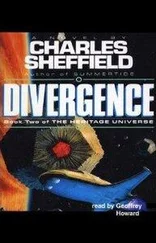My medical reputation was, if I say so myself, outstanding. An offer of pro bono services, which I explained to the clinic I did for one month each year, was welcomed. On my first day I examined the records for LaRona’s mother. They were disgusting. I offered to take responsibility for all nonstandard clinical tests, and for the preparation and administration of tailored antibodies.
LaRona and her mother came in as scheduled. I explained to them — or rather to LaRona, since her mother appeared to understand nothing — that we had a problem with incipient Paget’s disease. It would not affect her mother now, but if left untreated it would lead to chronic inflammation of the bones and their eventual softening. My diagnosis, prognosis, and proposed treatment were all completely accurate. I did not mention that Paget’s disease is a problem for the elderly, and that the symptoms would not manifest themselves for many years. Nor did I offer my opinion that in view of the mother’s lifestyle, her survival until she became elderly was highly unlikely.
LaRona listened to me with total attention and understanding. She was eye-achingly, mouth-wateringly beautiful. I longed to possess her forever.
Patience, I said to myself, patience.
LaRona and her mother would come to the clinic for six consecutive days. Her mother would be partially sedated for two hours. During those two hours I would administer the designed organism that would cure the disease. And in those same two hours, although it was not described in any treatment record or agreed to in advance, I intended that LaRona and I would sit and talk to each other.
We did. Slowly and awkwardly at first, but by the third day she was telling me of her dreams and hopes and aspirations. Shyly, she admitted to me that she wanted to become a physician. Just like you, she said. I doubted that. But incredibly, in that hellhole where she lived, she was observing diseases and attempting to make her own diagnoses.
While her mother lay snoring we wandered through the clinic together. I tested her. What did she think was wrong with that man’s hand? Why did that woman’s neck bulge so oddly? How would you treat it? She answered, I lectured, she questioned, I explained. Hours of bliss, and not only for me. She swooped on facts and theories and drained every drop of blood from them. It reminded me of my own youth, when new knowledge filled the world.
Our golden time had to end. On the sixth and final day of her mother’s treatment, I went down to the basement lab of my home and prepared my collection kit. I emptied the back of my car. The next few hours were my unavoidable period of vulnerability, when a sharp judicial officer seeing LaRona and the collection kit together could correlate means and crime.
Mother was sedated for her treatment. Instead of ranging through the clinic, today I took LaRona into the little office allocated to me. She brought with her, faint but unmistakable, a delicate odor of gardenias. There was a medical research conference going on north of the city, I said. I was heading there as soon as her mother’s treatment ended. Would LaRona possibly be interested in going with me? I could have her back by nine o’clock. I was careful to say, “back at the clinic.” Dr. Oliver Guest, of course, had no idea where she lived.
She hesitated. “What about Mother?”
“She’ll be all right. She knows her own way home, doesn’t she?”
Neither of us suggested that her mother might like to go with us. Nor was I about to offer to drive Mother home. I had always been careful to take public transportation when visiting LaRona’s district. There was no way that I would risk my car being seen there.
It was a foregone conclusion, as I had known it would be. To visit a medical research conference, LaRona would have agreed to send her mother home by parcel post.
Treatment ended. Mother was informed by LaRona that she wanted to do some shopping and would come home later. I was not mentioned. It was a dull day in February. As we drove away from the clinic it was already close to dusk.
Earlier in the day I had set our destination in the car’s AVC system. Someone older and more sophisticated would have been suspicious of the place to which the vehicle took us, a parking lot for an entertainment center open only during the summer months. LaRona was too happy and excited to notice. She babbled on about what she had seen earlier in the day. While I had been busy providing Mother with final — and, I suspect, futile — instructions for monitoring her own condition, LaRona had seen a human clone enter the clinic.
I listened with half an ear, and looked around carefully to make sure that the place was deserted. It was a popular venue for illicit sexual liaisons, but today no other car was present. I surreptitiously reached into the door compartment on my left-hand side, where the killing spray was ready and waiting.
At that crucial moment she asked, “Why is it more difficult to clone an organism from an adult than a fetal cell?”
Every rational brain cell told me to proceed, to use the spray, to perform the collection process. I needed only ten clear minutes and all evidence would be hidden away. But she was touching on twin passions of mine, clones and telomeres. I could not resist. With the spray can sitting in my left hand, I explained. A clone developed from adult cells would be born with its telomeres already shortened. It would have a reduced life expectancy. But telomeres are rebuilt in an organism’s germ cells. Thus fetal cell clones are provided with long telomeres and gain a “fresh start.”
She asked me two questions, both intelligent and searching. As I concluded my second answer, a police car drew up beside us. An officer appeared. He was black, very young. He politely asked me what we were doing in a deserted parking lot. I gave an honest answer. I was Dr. Oliver Guest, and I and my passenger were discussing problems of genetics. He nodded, but he said to LaRona, “How old are you, miss?”
“I’m fourteen.” She was wearing the skimpy top and short skirt favored in her district.
“Thank you.”
He moved back to his car. Even then, for the briefest moment, I thought they might leave. They were just cruising, and I was respectably dressed. But I heard his words to his woman partner: “Disgusting old fucker. Even if she is a hooker, she’s still only a kid. People like him oughta have their balls cut off.” And, returning to me, “I’m afraid that I must ask you to come with me.”
“My car —”
“Your vehicle will not be moved or damaged.” He glanced down, wary for possible weapons, and saw the spray. “What is that in your hand, sir?”
Use it on him, LaRona, and his partner? Impossible. I would botch any attempt. Unplanned violent action is alien to my nature.
It was over, then and there. I knew it, even though I had told the exact truth and nothing was farther from my mind than sex with LaRona. But policemen are creatures of habit. They would inspect my car, from sheer routine. They would find everything, my whole collection kit.
It was a tragedy. LaRona would have been a star, one of the crown jewels of my collection. It was not to be.
She is presumably still alive. Thinking about her now, I wonder if she has achieved her ambition. She is almost twenty. Has that keen mind and fiery desire for knowledge lifted her from awful family circumstances, into formal medical studies? I am curious, but only mildly so. As I say, she is now close to twenty. Much too old. Even were we to meet, she would no longer be of interest to me.
Читать дальше












